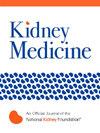Patient Perceptions of a Population Health Management Program to Improve Kidney Care: Optimizing care in CKD
IF 3.4
Q1 UROLOGY & NEPHROLOGY
引用次数: 0
Abstract
Rationale & Objective
A population health management intervention for a pragmatic cluster randomized control trial (Kidney CHAMP) aimed to improve care and outcomes in patients with chronic kidney disease (CKD) at high-risk of progression to dialysis dependence but not seeing a nephrologist. The Kidney CHAMP intervention provided comanagement support to primary care providers by nephrology electronic-consult, pharmacist-directed medication reconciliation, and nurse-delivered CKD patient education. We sought to learn patient perceptions of Kidney CHAMP intervention and whether the intervention improved their understanding of CKD.
Study Design
An ancillary study of Kidney CHAMP using qualitative methods.
Setting & Participants
Participants were sampled from Kidney CHAMP intervention group using 3 predefined strata (racial/ethnic minorities, low socioeconomic status, and multimorbidities) from May 2021 to February 2022.
Analytical Approach
We conducted semistructured televideo or telephone interviews that were transcribed and then inductively coded by 2 data analysts until thematic saturation was reached. Conventional content and thematic analyses were performed.
Results
In 45 patient interviews (mean age 75 ± 8 years, 44% women, 9% non-White race, and 59% low socioeconomic status), we identified 4 themes. First, patients expressed support for CKD comanagement by the primary care providers (PCPs) and nephrology team. Second, education sessions had variable effect on improving patients’understanding of CKD and its health implications. Third, patients’ self-efficacy and understanding of CKD management varied and was influenced by their understanding of its health implications. Fourth, patients appreciated education sessions and wanted more frequent sessions and actionable individualized guidance.
Limitations
Low representation of non-White individuals, recall bias, and lack of validated measures for health literacy, patient knowledge, and activation.
Conclusions
Patients with CKD who are managed by their PCP were supportive of remote comanagement by a nephrologist. Patients perceive some aspects of CKD health education to be beneficial; however, more effective approaches to communicating risk of CKD development and progression are needed.
Plain-Language Summary
In this ancillary qualitative study, we aimed to learn patient perspectives on a population health management approach to kidney disease comanagement between primary care providers and a multidisciplinary nephrology team. Patient interviewees were supportive of communication between primary care providers and the nephrology specialists, and most appreciated nurse-provided education sessions. However, despite exposure to the same standardized kidney education, interviewees demonstrated variable understandings of kidney disease and its health implications. Suggestions to improve the educational sessions included providing actionable individualized guidance and more frequent sessions.
患者对改善肾脏护理的人口健康管理计划的看法:优化CKD的护理
基本原理及目的:一项实用的聚类随机对照试验(Kidney CHAMP)的人群健康管理干预,旨在改善进展为透析依赖高风险但未就诊的慢性肾脏疾病(CKD)患者的护理和预后。Kidney CHAMP干预通过肾脏病电子咨询、药剂师指导的药物调解和护士提供的CKD患者教育,为初级保健提供者提供管理支持。我们试图了解患者对Kidney CHAMP干预的看法,以及干预是否提高了他们对CKD的理解。研究设计:采用定性方法对肾CHAMP进行辅助研究。设置,2021年5月至2022年2月,参与者从肾CHAMP干预组中抽样,使用3个预定义的阶层(种族/少数民族,低社会经济地位和多发病)。分析方法我们进行了半结构化的电视或电话采访,然后由2名数据分析师进行转录和归纳编码,直到主题饱和。进行了常规内容和专题分析。结果在45例患者访谈中(平均年龄75±8岁,44%为女性,9%为非白种人,59%为低社会经济地位),我们确定了4个主题。首先,患者表达了对初级保健提供者(pcp)和肾病学团队管理CKD的支持。第二,教育课程对提高患者对CKD及其健康影响的理解有不同的影响。第三,患者的自我效能感和对CKD管理的理解各不相同,并受到其对健康影响的理解的影响。第四,患者欣赏教育课程,并希望更频繁的课程和可操作的个性化指导。局限性:非白人个体的代表性缓慢,回忆偏差,缺乏健康素养、患者知识和激活的有效措施。结论由PCP管理的CKD患者支持由肾病专家远程管理。患者认为CKD健康教育的某些方面是有益的;然而,需要更有效的方法来沟通CKD发生和进展的风险。在这项辅助定性研究中,我们旨在了解患者对初级保健提供者和多学科肾脏病学团队之间人口健康管理方法的看法。患者受访者支持初级保健提供者和肾病专家之间的沟通,并且大多数人赞赏护士提供的教育课程。然而,尽管接受了相同的标准化肾脏教育,受访者对肾脏疾病及其健康影响的理解却不尽相同。改进教育会议的建议包括提供可操作的个性化指导和更频繁的会议。
本文章由计算机程序翻译,如有差异,请以英文原文为准。
求助全文
约1分钟内获得全文
求助全文

 求助内容:
求助内容: 应助结果提醒方式:
应助结果提醒方式:


